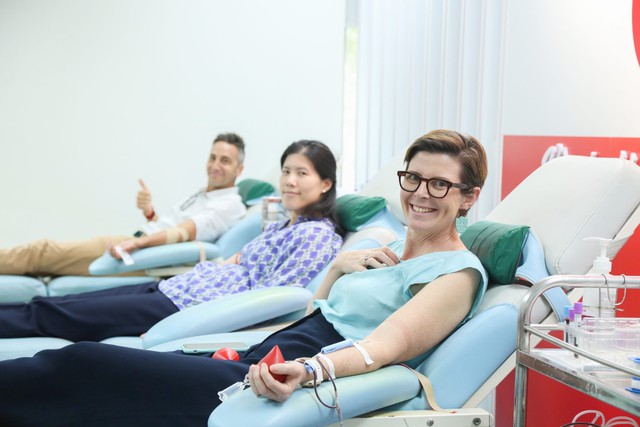For a healthier, stronger and safer Viet Nam
VGP - WHO is committed to working closely with the Ministry of Health, donors and other local and international partners, for a healthier, stronger and safer Viet Nam, said Dr. Angela Pratt, World Health Organization (WHO) Representative in Viet Nam.

Dr. Angela Pratt, World Health Organization (WHO) Representative in Viet Nam engages in a blood donation campaign in Viet Nam
Dr. Angela Pratt made the above commitment on the threshold of the Lunar New Year Festival in Viet Nam.
Dr. Angela Pratt said that Viet Nam's health system is at a critical juncture: a rapidly ageing population, a shifting disease burden – including the rising tide of noncommunicable diseases – as well as a fast-developing economy – are all creating increased demand for health quality health services.
Infectious diseases such as HIV/AIDS, hepatitis, tuberculosis and malaria, still afflict some groups in the population. Climate change is having a growing impact on the country's health. Potential risks to health security remain an ever-present threat.
For these reasons, in 2024 and beyond, WHO and the Ministry of Health will work together on five key areas to strengthen Viet Nam's health sector:
- Building a stronger legal and regulatory system to work towards the goal of advancing universal health coverage;
- Creating a stronger and more integrated primary healthcare system to help meet essential health needs for all;
- Strengthening national capacities in health emergency preparedness, readiness response and recovery;
- Reducing risk factors in noncommunicable disease and injuries and promotion of healthy lifestyles; and,
- Building a health sector more climate change resilient and environmentally sustainable, with action towards reducing health impacts of climate and environmental issues.
Strengthen national preparedness for pandemic potential
The detection of this new variant of interest – JN.1 – sadly is a reminder that COVID-19 continues to circulate globally and it continues to make people sick and, in some cases, it still causes death. So we still really cannot afford to be complacent about COVID-19.
No-one wants to get sick – so in the Tet season, with increased domestic and international travel – and many social gatherings – WHO encourages people to keep assessing their own personal risk as well as your loved ones and keep practicing basic health measures such as hand washing, mask wearing in crowded public places, and staying home if unwell. These simple measures harm no-one but can help to ensure that everyone has a safe and healthy Tet holiday.
In addition, COVID-19 booster vaccines are recommended to better protect against severe illness and death for high-risk groups, including: the elderly and older persons with underlying health conditions; anyone with moderate and severe immunocompromised conditions; pregnant women; and healthcare staff with direct patient contact.
The COVID-19 variant of interest – known as JN.1 is currently the most reported variant of interest globally – and has been reported in over 70 countries, including now in Viet Nam.
Although WHO is still gathering information about this new variant, based on the current evidence, the additional public health risk on the global level is still considered to be low.
However, countries experiencing the winter season, which includes parts of Viet Nam, should be aware that with COVID-19 and other viruses circulating, we are likely to see an increase in respiratory illness across the country.
Globally, with declining rates of testing and sequencing for COVID-19, it is increasingly challenging to monitor and evaluate the impact of emerging variants. So, WHO continues to encourage all countries, including Viet Nam, to strengthen systematic testing and sequencing to better understand the current situation and inform public health decision making.
In addition, Viet Nam, along with all countries, can continue to strengthen national and subnational preparedness and response capacities for COVID-19 and other infectious pathogens with pandemic potential./.
